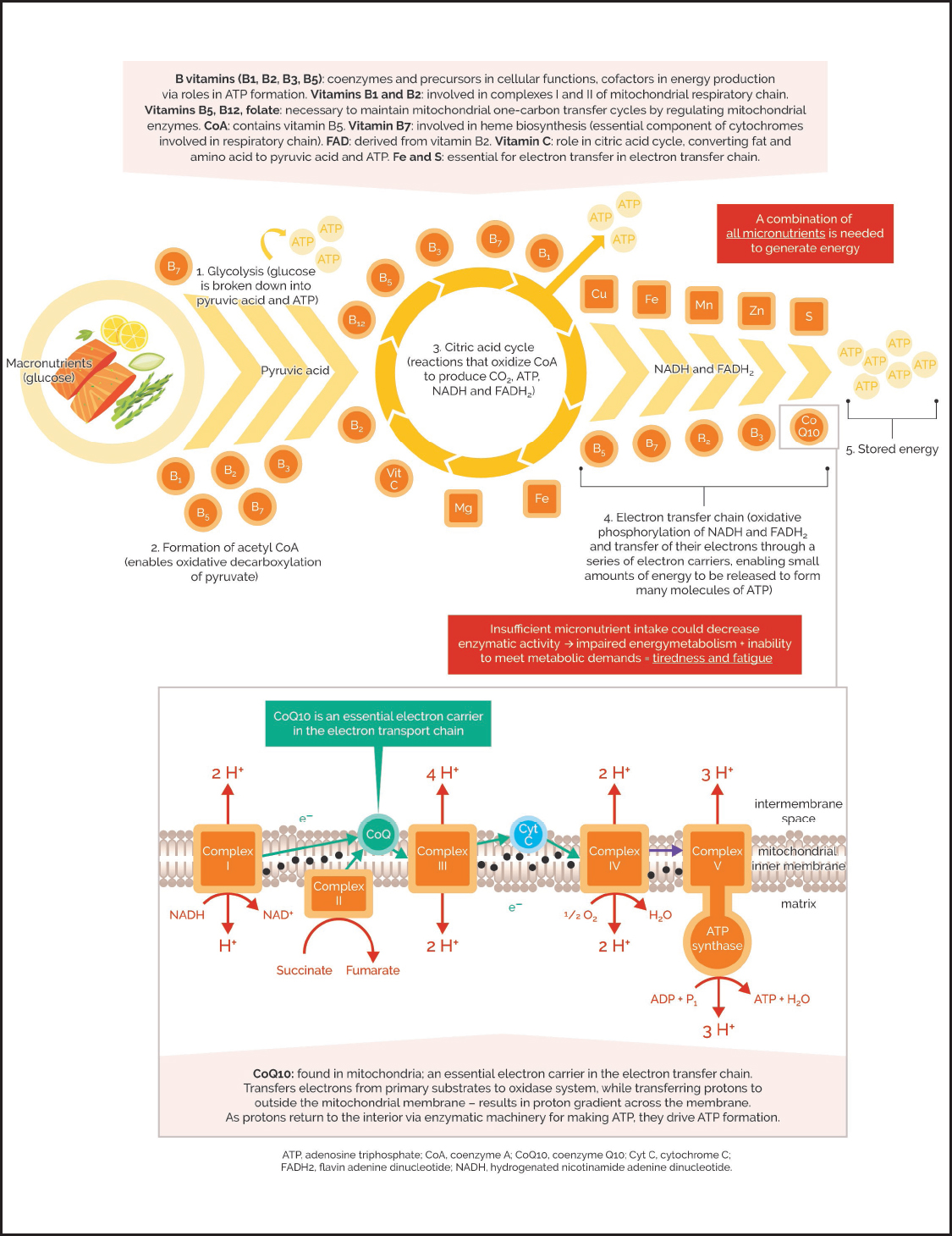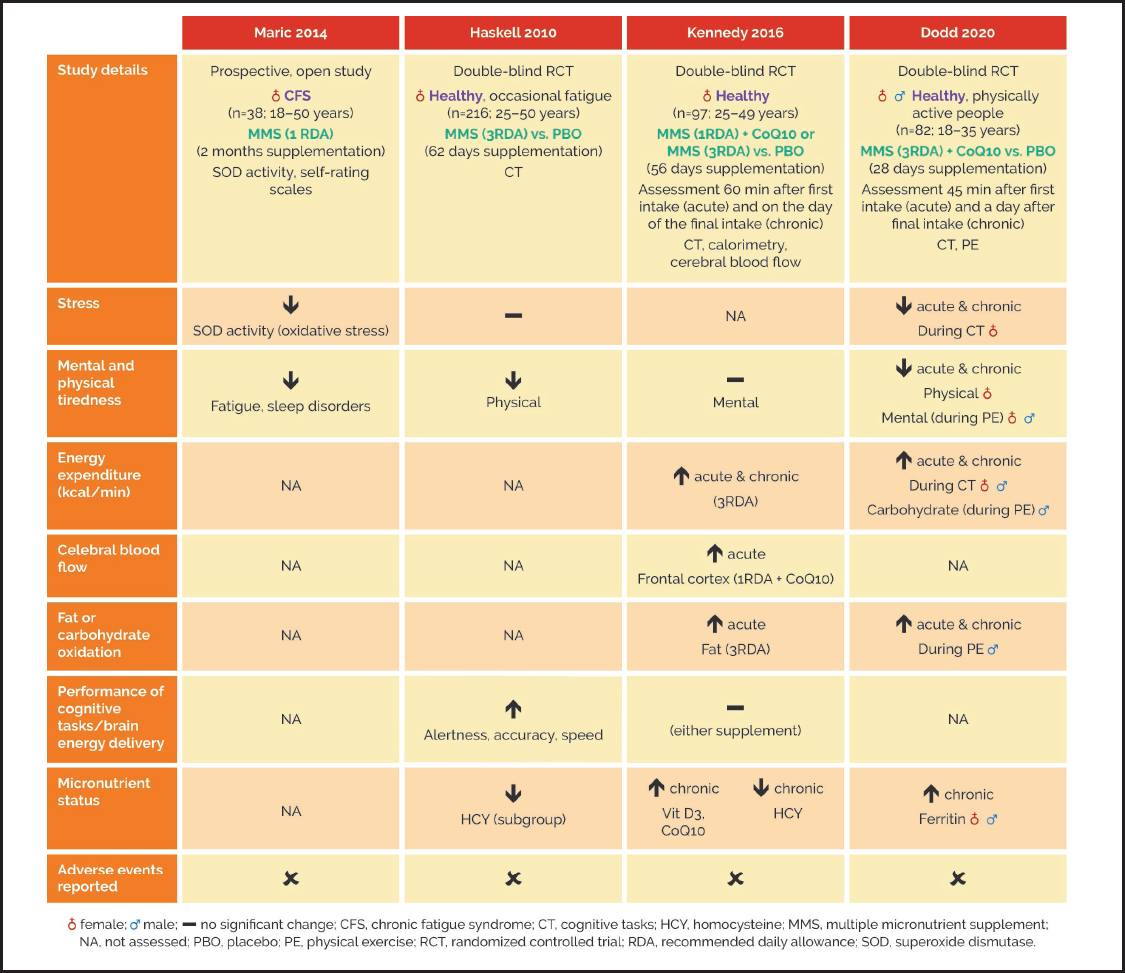INTRODUCTION
Low energy, physical and mental fatigue, and consequent adverse effects on cognitive performance (1) frequently occur in the general population. Most people who go to their doctor with an unexplained complaint (particularly females) present with fatigue (2). Micronutrient intakes below the recommended dietary allowance (RDA) are also common, even in industrialized countries (3-5). But are there any links between these two factors- And is there a rationale and evidence to indicate that supplementation with multiple micronutrients can help to restore micronutrient levels and thereby have a beneficial effect on energy, cognition, and hence wellbeing-
MULTIPLE MICRONUTRIENTS ARE ESSENTIAL FOR ENERGY METABOLISM
To stay alive, grow and reproduce, all parts of the human body require energy for processes such as cell division, homeostasis, active transport (i.e., moving molecules against concentration gradients), and transmission of nerve impulses. Even planning complex tasks and making decisions require a lot of energy, and the brain is the largest consumer of energy in the body (6).
During energy production, ingested macronutrients are broken down into glucose, fatty acids, and/or amino acids and utilized by cells to form energy, primarily stored in adenosine triphosphate (ATP) (7). The body's preferred dietary source for synthesizing ATP is glucose, which undergoes a series of metabolic reactions mainly in the mitochondria, collectively known as cellular respiration (Fig. 1). The brain, which is unable to store energy and therefore requires a continuous supply of glucose, consumes approximately 20 % of glucose-derived energy at rest, with acute dynamic variations corresponding to neuronal signaling in the brain. Metabolic regulation is critical to neuronal function.

Figura 1. Multiple micronutrients are required for efficient energy metabolism, and are essential to support every step of cellular respiration.
Every stage of energy metabolism is dependent on the presence of multiple micronutrients, which act as essential components, coenzymes, or precursors (Fig. 1). These include B vitamins and vitamin C, iron, magnesium, zinc, copper, manganese, and sulfur, as well as coenzyme Q10 (CoQ10), a driver of ATP formation. CoQ10, which has antioxidant properties, also helps to regulate reactive oxygen species and reduce oxidative stress (8,9), known to play a role in chronic fatigue (10). In addition to energy production, B vitamins have vital roles in many aspects of brain function, such as DNA/RNA synthesis and/or repair, and the synthesis of numerous neurochemicals and signaling molecules (Fig. 2) (11). Other micronutrients also play a role in brain function, including zinc in receptor binding and the formation of metalloproteins, calcium in signal transduction and the membrane potential, and zinc and magnesium in neurotransmission (12).
SUBOPTIMAL NUTRITION CAN AFFECT ENERGY METABOLISM – AND IS COMMON IN THE GENERAL POPULATION
Even mild deficiencies in micronutrients in ‘healthy’ adults may decrease enzymatic activity and impair energy production, resulting in lack of energy and general fatigue (13). Suboptimal levels of B vitamins and the inability to meet metabolic demands lead to poor mood and irritability, and may also have a negative impact on the ability to concentrate, general mental processes, and ultimately cognition (11,14) (Fig. 2). Several factors can affect micronutrient stores, including dietary intake, physical and mental exertion (multiple micronutrients are necessary to replace the energy that is consumed), illness, seasonal demands (such as lower vitamin D levels in the winter), and factors specific to women (e.g., menstruation leads to low iron levels and reports of tiredness in 71 % of women [15]) (13).
Ideally, a sufficient and balanced diet should cover daily micronutrient requirements. Yet a healthy diet can be difficult to achieve and is dependent on a wide range of social, economic, educational, ethnic, and cultural factors. Thus, suboptimal (i.e., below the RDA) micronutrient intakes are surprisingly common – even in industrialized countries (Fig. 2). Reported suboptimal micronutrient intakes vary according to age, but in Europe include vitamins A, D, E, folate, iron, zinc, and selenium across all age groups, vitamin C and copper in adolescents and adults, and B vitamins, calcium, and copper in older adults (16). In a recent evaluation of healthy blood donors in Italy, only a low proportion had adequate plasma levels of folate and vitamin B12, but a high proportion had elevated levels of the potentially toxic amino acid, homocysteine (17).
SUPPLEMENTATION WITH MULTIPLE MICRONUTRIENTS MAY IMPROVE NUTRITIONAL STATUS AND SUPPORT ENERGY METABOLISM
Even when used alone (mostly in trials conducted in women [13]), micronutrients reduced fatigue (vitamins B1 and D, iron), increased activity and feelings of being energetic (vitamin B1), increased muscle endurance (zinc), improved exercise tolerance (magnesium) and physical capacity/performance (CoQ10 [18]), and improved physical recovery (CoQ10 [19]). They also had a beneficial impact on wellbeing and the feeling of being clearheaded and composed (vitamin B1), and on symptoms of seasonal affective disorder, including depression (vitamin D). Thus, it is logical to include such vitamins and minerals in multiple micronutrient supplementation (MMS) to improve/support several aspects of mental and physical wellbeing.
Due to their strong interrelationship in metabolic pathways, an adequate supply of multiple micronutrients is vital for efficient energy production. However, as seen in figure 2, deficiencies of multiple micronutrients are prevalent in the general population. Hence, there is a strong rationale to use a supplement containing a combination of micronutrients, particularly B vitamins, to improve energy levels. Several clinical trials have demonstrated that MMS can improve nutritional status (20-22). Benefits of MMS included increased energy levels, reductions in physical and mental fatigue, improvements in concentration, mental stamina, and mood, and reductions in feelings of depression, anxiety, and stress (13).
One prospective open-label trial (10) and three double-blind, randomized, controlled trials (23-25) have evaluated the effects of MMS ± CoQ10 on energy, cognition, and wellbeing (Fig. 3). The formulation (Supradyn®, Bayer) differed slightly within each trial, but mostly contained the water-soluble vitamins in amounts that were three times their RDA (10,23-25).

Figura 3. Overview of the effects of MMS ± CoQ10 (Supradyn) on factors of energy, cognition, and nutritional status.
The open-label study was carried out in women with chronic fatigue syndrome (CFS) (10). Oxidative stress (due to diminished antioxidant capacity and/or decreased activity of antioxidant enzymes) plays a prominent role in CFS, and can lead to fatigue, pain, gastrointestinal problems, and cognitive impairment (10). Thus, treatment with a micronutrient supplement could improve symptoms in CFS patients. In women with CFS, MMS for two months was prospectively evaluated to determine objective parameters of antioxidant capability, including superoxide dismutase (SOD) activity, and self-assessment of improvement (10). Results indicated that MMS significantly reduced fatigue and SOD activity (suggesting that antioxidant activity improved with supplementation). There were also significant improvements in sleep disorders, autonomic nervous system symptoms (e.g., dizziness, anxiety, etc.), frequency and intensity of headaches, and subjective feelings of infection.
The other three randomized, double-blind, placebo-controlled studies evaluated the effects of MMS ± CoQ10 in healthy subjects (23-25).
In healthy females (n = 216), the effects of MMS (3RDA) for two months on indicators of energy (fatigue and cognitive function) were compared with placebo (23). Supplementation reduced fatigue and improved the speed and accuracy of multitasking, and the authors suggested that MMS could ultimately help in the completion of demanding tasks. It is likely that the addition of CoQ10 (essential for ATP production) to MMS could have further beneficial effects.
In another study in healthy women (n = 97), the effects of acute and chronic administration of MMS + CoQ10 (1RDA) or a higher dose of MMS with no CoQ10 (3RDA) were compared to placebo (24). During the cognitive task performance, only the single dose of MMS + CoQ10 was able to increase the cerebral blood-flow hemodynamic response in the frontal cortex during tasks that activate this brain area. Supplementation with the higher dose led to a dose-dependent increase in total energy expenditure after acute (60 minutes) and chronic (8 weeks) supplementation, and fat oxidation after a single dose. Both supplements significantly increased vitamin D3 levels and decreased homocysteine levels compared with placebo after 8 weeks. However, there were no interpretable effects on mood or cognitive performance with either dose of supplement compared with placebo.
To assess the impact of MMS + CoQ10 (3RDA) on metabolically challenging exercise and cognitive tasks, supplementation for 28 days was compared to placebo in healthy young women and men with moderate activity levels (25). Supplementation was found to increase energy expenditure during cognitive tasks even after a single dose, and this effect was sustained when measured a day after chronic administration had concluded; the observed effects were greater in males. Carbohydrate oxidation and energy expenditure during exercise also increased in males – the first time this has been demonstrated. In females, subjective mental and physical tiredness were reduced during exercise, and stress ratings were lower after cognitive tasks. The effects on subjective mental tiredness during exercise in males and females were noted after acute assessment (commencing 45 min after intake) but were greatest after chronic intake. Ferritin levels were higher in males and females after 28 days supplementation in the subset who provided blood samples. Males were found to have sufficient levels at baseline, while females were marginally deficient. The study is important because it shows that even a single dose of MMS + CoQ10 can modulate energy expenditure and subjective tiredness and highlights the cumulative and sustained effect of chronic supplementation.
CONCLUSIONS
Suboptimal (i.e., below the RDA) micronutrient intakes are common, even in industrialized countries. This can have a direct impact on energy levels, cognitive performance, and general wellbeing. Suboptimal nutrition, combined with the interrelationship between numerous vitamins and minerals in metabolic pathways, suggests that supplementation with multiple micronutrients is justified in the general population. Several trials have evaluated the effects of MMS ± CoQ10 in healthy women and men and in women with CFS, and have shown that is has clinically-proven beneficial effects on energy, cognitive performance, and wellbeing.















